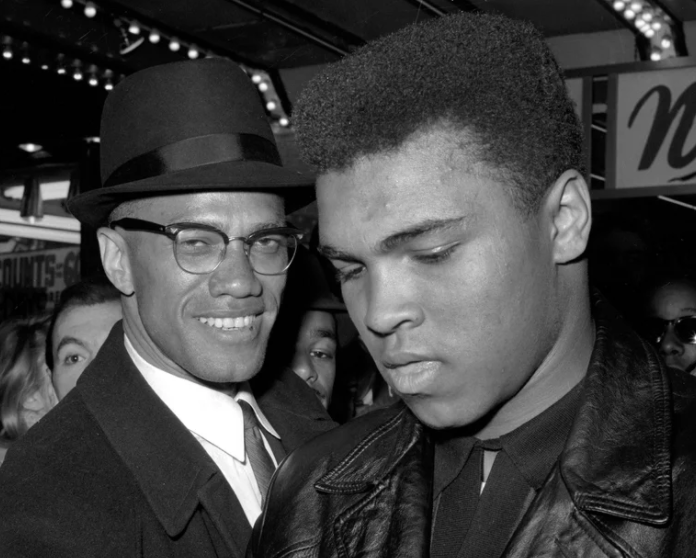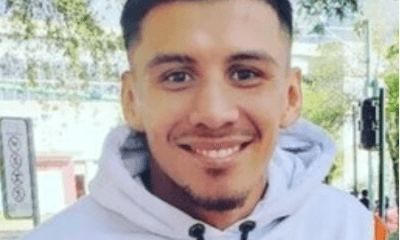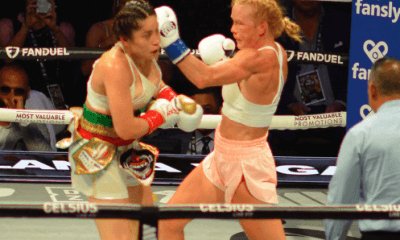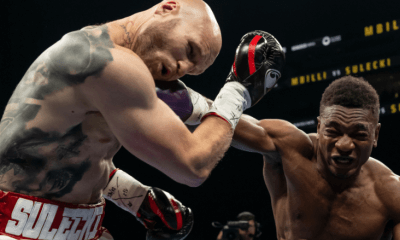Featured Articles
The Hauser Report: Muhammad Ali, Malcolm X, and Netflix

Muhammad Ali and Malcolm X were two of the most charismatic and important people of the twentieth century. Five years ago, Randy Roberts and Johnny Smith co-authored Blood Brothers: The Fatal Friendship between Muhammad Ali and Malcolm X. In the authors’ words, it was “the story of how Cassius Clay became Muhammad Ali and the central role Malcolm X played in his life. It is a tale of friendship and brotherhood, love and deep affection, deceit, betrayal, and violence during a troubled time.”
Blood Brothers is the most thorough and compelling book written to date on the relationship between these two men. The events culminating in Malcolm’s assassination were particularly well-told. Subsequently, the book gave birth to two film deals. A+E Studios purchased an option to develop it into an eight-part scripted dramatic series. That project may, or may not, come to fruition. Meanwhile, Netflix bought documentary rights to Blood Brothers and released its film on September 9.
The Netflix documentary charts the lives of Cassius Clay and Malcolm X as they change course to intersect and then separate amidst bitterness, recrimination, and violence. Other than Clay’s 1964 conquest of Sonny Liston, there’s virtually no boxing in the narrative. As with the book, Malcolm’s 1965 assassination is the dramatic highpoint of the film. In some respects, Ali comes across as having acted poorly because of his abandonment of Malcolm.
The documentary has several flaws. First, it repeats the long-discredited story that Cassius Clay threw his Olympic gold medal in the Ohio River after being refused service in a local restaurant. That tale was fabricated by ghost-writer Richard Durham (an editor for the Nation of Islam newspaper, Muhammad Speaks) and Herbert Muhammad (a son of Nation of Islam leader Elijah Muhammad) for inclusion in Ali’s 1976 autobiography. It’s not true; I think the filmmakers were told it’s untrue; and its insertion in the documentary is unfortunate.
Also, the much-needed positive message of self-love and black empowerment that was central to Nation of Islam teaching is explored in the documentary. But more information on the underside of the Nation of Islam would have been welcome. Yes, viewers are told that Elijah Muhammad was the father of eight children by six different teenage girls who were his private secretaries. But that was just one example of hypocrisy within the Nation. More exposition would have been welcome.
Still, Blood Brothers is a wonderful documentary and sets a high standard for any documentary about Muhammad Ali and Malcolm X that might follow. The archival film footage and still photographs are superb. A succession of well-chosen talking heads carry the narrative from beginning to end. Cassius Clay (and then Muhammad Ali) is shown as he was between the years of 1958 and 1965. His spirit – and that of Malcolm – is faithfully portrayed. And that’s important because, as professor and media commentator Todd Boyd notes toward the end of the film, “The Ali that has been presented to the public since 1996 is a false image. They’ve managed to edit out those things that made Muhammad Ali controversial in another era.”
So true. And remember; many of the things that made Ali controversial also made him great. Indeed, when Ali’s image was sanitized for economic gain after the Atlanta Olympics, metaphorically it brought him back full circle to 1960 when twelve wealthy white men known as the Louisville Sponsoring Group helped launch his ring career and groomed him as a commodity as they might have groomed a race horse.
Years ago, Ali told me, “When Malcolm broke with Elijah, I stayed with Elijah. I believed that Malcolm was wrong and Elijah was God’s Messenger. I was in Miami, training, when I heard Malcolm had been shot to death. Some brother came to my apartment and told me what happened. It was a pity and a disgrace he died like that because what Malcolm saw was right, and after he left us, we went his way anyway.”
That thought is echoed in Blood Brothers by Hana Ali, who recounts a conversation in 2003 when her father told her that, in Hana’s words, “turning his back on Malcolm was one of his greatest regrets. He wished he could go back and tell Malcolm that he was sorry and that he loved him and he was his friend and that he was right about so many things.”
Believers might choose to think that Ali has now had that conversation with Malcolm in Paradise.
Thomas Hauser’s email address is thomashauserwriter@gmail.com. His next book – Broken Dreams: Another Year Inside Boxing – will be published this autumn by the University of Arkansas Press. In 2004, the Boxing Writers Association of America honored Hauser with the Nat Fleischer Award for career excellence in boxing journalism. In 2019, he was selected for boxing’s highest honor – induction into the International Boxing Hall of Fame.
To comment on this story in the Fight Forum CLICK HERE
-

 Featured Articles3 weeks ago
Featured Articles3 weeks agoAvila Perspective, Chap. 330: Matchroom in New York plus the Latest on Canelo-Crawford
-

 Featured Articles2 weeks ago
Featured Articles2 weeks agoVito Mielnicki Jr Whitewashes Kamil Gardzielik Before the Home Folks in Newark
-

 Featured Articles4 weeks ago
Featured Articles4 weeks agoAvila Perspective, Chap 329: Pacquiao is Back, Fabio in England and More
-

 Featured Articles3 weeks ago
Featured Articles3 weeks agoOpetaia and Nakatani Crush Overmatched Foes, Capping Off a Wild Boxing Weekend
-

 Featured Articles2 weeks ago
Featured Articles2 weeks agoCatching Up with Clay Moyle Who Talks About His Massive Collection of Boxing Books
-

 Featured Articles4 weeks ago
Featured Articles4 weeks agoFabio Wardley Comes from Behind to KO Justis Huni
-

 Featured Articles1 week ago
Featured Articles1 week agoMore Medals for Hawaii’s Patricio Family at the USA Boxing Summer Festival
-

 Featured Articles4 weeks ago
Featured Articles4 weeks agoDelving into ‘Hoopla’ with Notes on Books by George Plimpton and Joyce Carol Oates





















